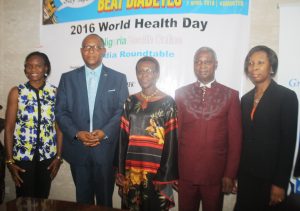
The Minister of Health, Prof. Isaac Adewole said yesterday at the NHO Media Roundtable on Diabetes that the disease is gradually becoming an epidemic worldwide and Nigeria remains one of the countries with a large number of people living with diabetes.
Speaking at the NHO’s Media Roundtable on Diabetes organised in partnership with Roche diagnostics and Rainbow Specialist Medical Center, the Minister who was represented by the Chief Medical Director of Lagos University Teaching Hospital (LUTH), Prof. Chris Bode, said Nigerians should be aware that diabetes is essentially a lifestyle disease and can be prevented simply by adopting a healthy lifestyle which involves good diets, regular exercise and health consciousness.
He lamented that diabetes is a silent killer, which is why many people in the country do not know they have the disease and continue to live without taking necessary precaution to control it. According to him, there’s a great need for everyone in the country to join hands and prevent diabetes while those already diagnosed should adhere strictly to their doctor’s recommendations on control measures.
Welcoming guests and participants to the Roundtable, the Medical Director, Roche Nigeria, Dr. Jeanne Coulibaly commended NHO for the Roundtable initiative to create more awareness about diabetes in Nigeria.
“Good health is important for everyone to be productive and be able to develop the country. We at Roche are conscious of this fact and we strive to assist the communities everywhere we are located, in providing drugs, diagnostic equipment and generally helping in the dissemination of vital health information to the people.”
Dr. Coulibaly further told participants, that Roche, a Swiss company a Swiss global health-care company that operates in Nigeria under three divisions namely, Pharma, Diagnostics and diabetes care. She disclosed that company has been at the forefront of providing information to Nigerians on diabetes and collaborates with different organisations and health institutions to provide access to quality care for people living with diabetes in Nigeria.
The Medical Director further pledged that the company would continue to support government, patients and Nigerians in general in efforts to control diabetes now on the increase worldwide.
In a presentation, the WHO Coordinator, Lagos, Dr. Omoniyi Abidoye disclosed that a person dies from diabetes every 60 seconds worldwide. According to him, about 347 million people have diabetes in the world adding that there is an emerging global epidemic of the disease due to increases in overweight, including obesity and physical inactivity.
He predicted that diabetes will become the 7th leading cause of death in the world by 2030, adding that deaths from the condition would also rise by more than 50% in the next 10 years.
Diabetes mellitus, or simply diabetes, is a chronic disease that occurs when the pancreas is no longer able to make insulin, or when the body cannot make good use of the insulin it produces. Insulin is a hormone made by the pancreas, that acts like a key to let glucose from the food we eat pass from the blood stream into the cells in the body to produce energy. All carbohydrate foods are broken down into glucose in the blood. Insulin helps glucose get into the cells.
Not being able to produce insulin or use it effectively leads to raised glucose levels in the blood (known as hyperglycaemia). Over the long-term high glucose levels are associated with damage to the body and failure of various organs and tissues.


